Why You Should Never Leave a Guinea Pig in a Parked Car
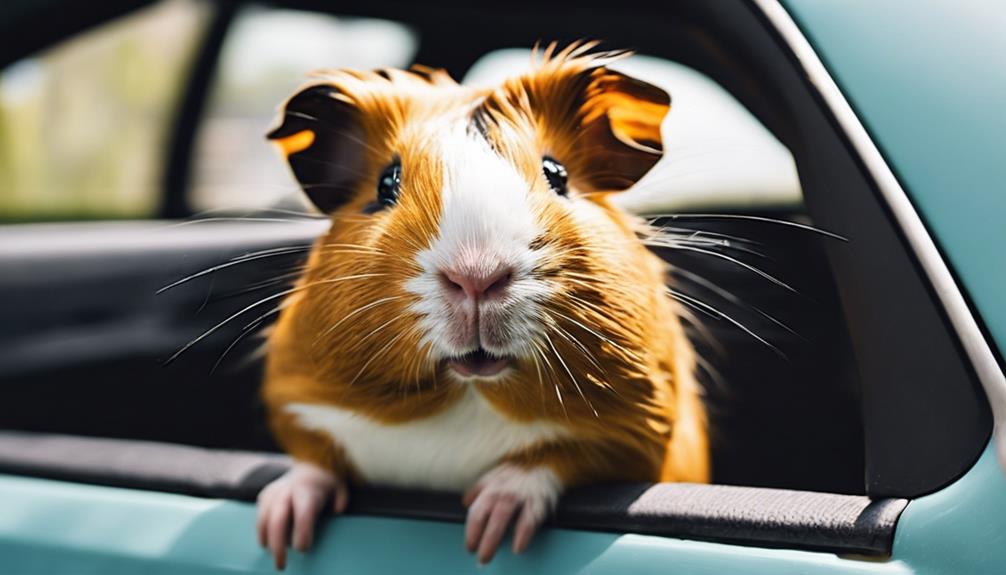
Leaving a guinea pig in a parked car can be extremely dangerous, as these small animals are highly sensitive to heat. The temperature inside a car can quickly rise to dangerous levels, even on a mild day. Guinea pigs are unable to sweat and regulate their body temperature like humans do, making them particularly vulnerable to heatstroke.
If you ever see a guinea pig left in a parked car, immediate action is required to ensure their safety. Contacting the authorities or attempting to locate the owner should be the first steps taken. In the meantime, providing some shade and water for the guinea pig can help alleviate some of the heat stress they may be experiencing. Remember, it's always better to be safe than sorry when it comes to the well-being of these small pets.
Key Takeaways
- Guinea pigs are at risk of severe heatstroke and death in parked cars.
- Owners must recognize the risks and avoid leaving pets in hot cars.
- Proper ventilation and temperature control are crucial for guinea pigs' safety.
- Neglecting guinea pigs in cars can lead to legal, financial, and health consequences.
Dangers of Heat in Parked Cars
Leaving a guinea pig in a parked car on a hot day can lead to severe heatstroke and even death due to the rapid rise in temperature within the vehicle. Pet safety should always be a top priority, and understanding the dangers of heat in parked cars is critical for responsible pet ownership. Vehicles can quickly become ovens in the sun, creating a dangerous environment for any living creature left inside. Guinea pigs, with their delicate constitutions, are particularly vulnerable to extreme temperatures.
It is essential to recognize the risks associated with leaving pets unattended in vehicles. Even with the windows cracked open, the heat inside a car can escalate rapidly, putting the animal in danger. Guinea pigs are unable to regulate their body temperature as effectively as humans, making them highly susceptible to heat-related illnesses. As caring pet owners, it's our responsibility to assure the safety and well-being of our furry companions by never exposing them to such vehicle dangers.
Risk of Heatstroke for Guinea Pigs
In high temperatures, guinea pigs are at an heightened risk of heatstroke due to their limited ability to regulate body temperature effectively. This vulnerability makes it important for guinea pig owners to be vigilant and proactive in protecting their pets from extreme heat. Heatstroke is a serious condition that can quickly escalate and lead to irreversible harm or even death in guinea pigs. It's essential for owners to understand the signs of heatstroke, such as lethargy, rapid breathing, and drooling, and take immediate action if they suspect their guinea pig is overheating.
Preventing heatstroke in guinea pigs is a key aspect of responsible pet ownership and animal welfare. This preventable tragedy can be avoided by providing adequate shade, ensuring access to fresh water at all times, and avoiding exposing guinea pigs to high temperatures for prolonged periods. By prioritizing the well-being of their furry companions and being mindful of the risks associated with heat exposure, guinea pig owners can help safeguard their pets from this potentially fatal condition.
Lack of Proper Ventilation Concerns
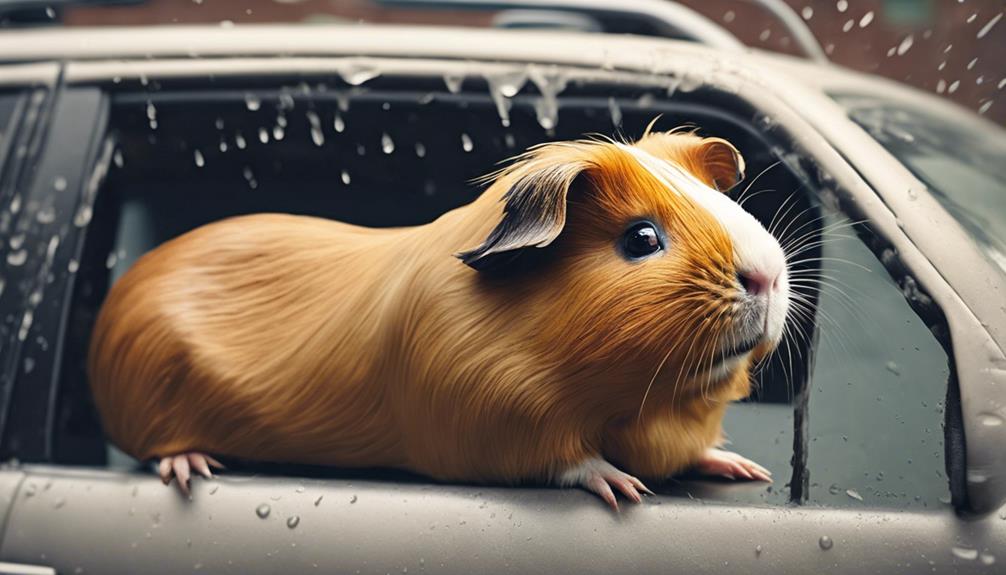
Proper ventilation is essential for ensuring the well-being of guinea pigs in enclosed spaces, such as parked cars. Ventilation plays a vital role in maintaining a safe and comfortable environment for pets, including guinea pigs. When a guinea pig is left in a parked car without adequate ventilation, the risk of heat buildup and poor air quality increases greatly. Without proper airflow, the temperature inside the car can rise rapidly, leading to heat stress, dehydration, and even heatstroke in guinea pigs.
Pet safety should always be a top priority, and ensuring proper ventilation is a key aspect of responsible pet ownership. Adequate airflow helps regulate the temperature inside the car and prevents the accumulation of harmful gases that can be detrimental to your guinea pig's health. By opening windows slightly or using car shades to allow for air circulation, you can help mitigate the risks associated with leaving a guinea pig unattended in a parked car.
Rapid Temperature Increase Effects
A guinea pig left in a parked car during hot weather can experience rapid temperature increases that pose serious risks to its health and well-being. Guinea pigs have limited abilities for temperature regulation, making them highly susceptible to heat stress. When exposed to high temperatures in an enclosed space like a car, their bodies struggle to cool down efficiently, leading to potential heatstroke and even death.
Pet safety should always be a top priority, and leaving a guinea pig unattended in a parked car puts them in grave danger. The rapid temperature increase can quickly elevate their body temperature to dangerous levels, causing distress and discomfort. It's critical to never underestimate the impact of extreme heat on these small animals.
To safeguard the well-being of your guinea pig, always provide a cool and well-ventilated environment. Never leave them alone in a parked car, especially during hot weather. By being proactive and mindful of their needs, you can help keep your furry friend safe and healthy.
Dehydration and Health Implications
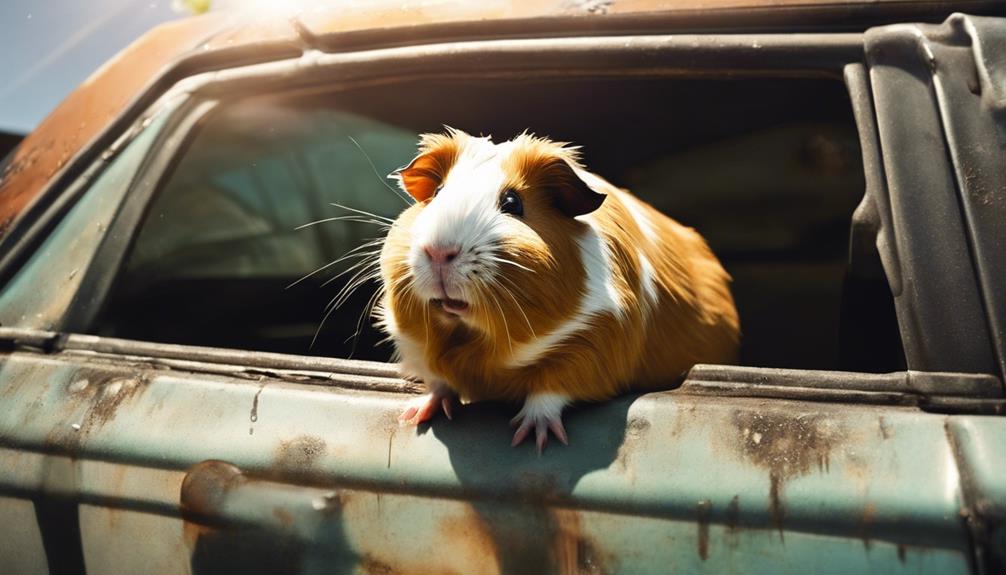
Caution must be exercised to prevent dehydration in guinea pigs, as it can lead to severe health implications. Guinea pigs are highly susceptible to dehydration due to their small size and fast metabolism. To prevent dehydration, make sure they always have access to fresh water. Monitoring their water intake is vital, especially during hot weather or in stressful situations. Dehydration can quickly escalate, causing serious health issues such as organ failure and even death. It's essential to be proactive in making sure your guinea pig stays hydrated.
Regularly check your guinea pig for signs of dehydration, such as sunken eyes, dry mouth, lethargy, or poor skin elasticity. If any of these symptoms are present, immediate action is necessary. Encourage drinking by providing fresh vegetables with high water content, such as cucumber or lettuce. Additionally, offer water through a bottle or a shallow dish to suit your guinea pig's preferences.
Stress and Anxiety in Confined Spaces
To guarantee the well-being of your guinea pig, it's imperative to comprehend how stress and anxiety can manifest in confined spaces. Guinea pigs are sensitive animals that can easily experience mental health issues when subjected to stressful environments. When confined in small spaces, such as a parked car, they may exhibit signs of claustrophobia and anxiety. These feelings can lead to a decline in their overall well-being and health.
In confined spaces, guinea pigs may become restless, show signs of increased heart rate, and exhibit erratic behavior. These are clear indicators of stress and anxiety. It's critical for pet owners to recognize these signals and take immediate action to remove their guinea pig from such environments.
Potential Legal Consequences
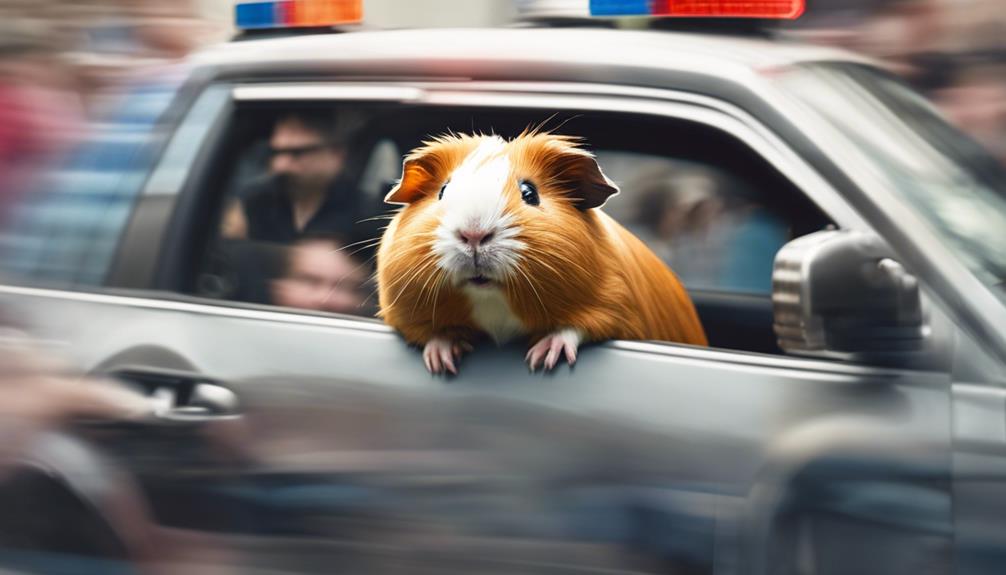
Leaving a guinea pig in a parked car can have serious legal ramifications. Owners may face legal penalties for neglect, criminal charges if harm comes to the animal, and civil lawsuits for any damage caused.
Understanding the potential legal consequences is essential in preventing any harm to the guinea pig and avoiding legal trouble.
Legal Penalties for Neglect
Neglecting a guinea pig and leaving it unattended in a parked car can result in severe legal penalties under animal welfare laws. Such actions are considered acts of cruelty and are punishable by law. Below is a table outlining potential legal consequences for neglecting a guinea pig:
| Legal Penalties for Neglect |
|---|
| Fine |
| Community Service |
| Animal Ban |
| Criminal Record |
| Jail Time |
It is important to understand that neglecting the welfare of any animal, including guinea pigs, is a serious offense that can have lasting repercussions. By adhering to animal welfare laws and providing proper care, individuals can avoid facing these legal penalties and safeguard the well-being of their pets.
Criminal Charges for Harm
When causing harm to a guinea pig, individuals may face serious criminal charges with potential legal consequences. Laws concerning animal welfare are in place to protect the well-being of all creatures, including guinea pigs.
Engaging in actions that result in harm to these animals can lead to criminal charges being brought against the responsible party. Depending on the severity of the harm inflicted, individuals may be prosecuted for animal cruelty or neglect. These charges can carry significant penalties, such as fines, community service, probation, or even imprisonment.
It's essential to understand the legal ramifications of causing harm to a guinea pig, as respecting animal welfare is a critical aspect of being a responsible and compassionate member of society.
Civil Lawsuits From Damage
Causing harm to a guinea pig can result in facing civil lawsuits for damages, potentially leading to financial liabilities and legal repercussions. Owners who neglect their pets may find themselves embroiled in legal battles seeking financial compensation for the harm caused. Here are three important points to bear in mind regarding civil lawsuits from damage:
- Financial Compensation: Owners may be held responsible for covering veterinary bills, rehabilitation costs, and other expenses related to the guinea pig's recovery.
- Legal Action: Individuals can file lawsuits to seek justice for the harm inflicted on their pets, potentially resulting in legal proceedings and court involvement.
- Liability Issues: Negligence or mistreatment of animals can lead to compensation claims against the responsible party, highlighting the importance of proper care and attention towards pets.
Importance of Responsible Pet Ownership
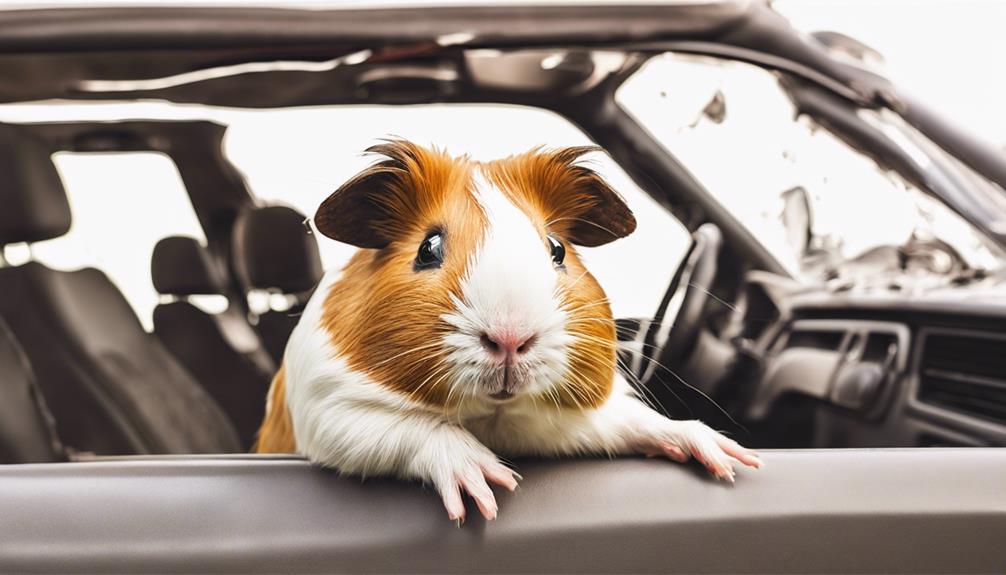
Why is responsible pet ownership important for the well-being of our animal companions? Responsible pet ownership is vital for establishing the safety and happiness of our beloved pets. By being responsible pet owners, individuals can prevent harm and promote the well-being of their animal companions. This includes being aware of pet safety guidelines and understanding the impact of environmental factors such as heat on our pets.
| Importance of Responsible Pet Ownership | Benefits |
|---|---|
| Ensures the safety and well-being of pets | Provides a loving and secure environment |
| Promotes healthy habits and routines | Enhances the bond between pet and owner |
| Prevents accidents and injuries | Fosters a sense of responsibility and empathy |
Frequently Asked Questions
Can Guinea Pigs Tolerate Heat Better Than Other Pets?
Guinea pigs have limited tolerance for heat compared to other pets. Owners should be vigilant in providing cooling methods like frozen water bottles and ensuring hydration needs are met. High temperatures can lead to behavior changes and stress.
Are There Any Special Products or Tools That Can Help Keep a Guinea Pig Cool in a Parked Car?
To keep a guinea pig cool in a parked car, use cooling pads, portable fans, ice packs, and misting bottles. These products are essential for ensuring the comfort and well-being of the furry companion during hot weather.
How Quickly Can a Parked Car Become Dangerously Hot for a Guinea Pig?
A parked car can quickly become dangerously hot for a guinea pig, jeopardizing their temperature regulation abilities. Pet owners must be aware of this risk to safeguard their furry friends and never leave them unattended in parked cars.
Are There Any Specific Breeds of Guinea Pigs That Are More Susceptible to Heatstroke?
Some guinea pig breeds, like the Teddy and Abyssinian, may be more susceptible to heatstroke due to their thicker coats. When it comes to heat tolerance, these breeds might need extra care and attention.
Are There Any Warning Signs or Symptoms That Indicate a Guinea Pig Is Suffering From Heatstroke in a Parked Car?
Heatstroke prevention is vital for guinea pigs in parked cars. Warning signs like excessive panting, drooling, or lethargy indicate heatstroke. Emergency care involves cooling the guinea pig gently and seeking immediate veterinary treatment to prevent serious consequences.











